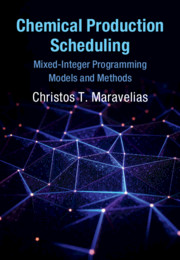Book contents
- Chemical Production Scheduling
- Cambridge Series in Chemical Engineering
- Chemical Production Scheduling
- Copyright page
- Dedication
- Contents
- Preface
- Part I Background
- Part II Basic Methods
- Part III Advanced Methods
- Part IV Special Topics
- 12 Solution Methods: Sequential Environments
- 13 Solution Methods: Network Environments
- 14 Real-Time Scheduling
- 15 Integration of Production Planning and Scheduling
- Index
- References
13 - Solution Methods: Network Environments
from Part IV - Special Topics
Published online by Cambridge University Press: 01 May 2021
- Chemical Production Scheduling
- Cambridge Series in Chemical Engineering
- Chemical Production Scheduling
- Copyright page
- Dedication
- Contents
- Preface
- Part I Background
- Part II Basic Methods
- Part III Advanced Methods
- Part IV Special Topics
- 12 Solution Methods: Sequential Environments
- 13 Solution Methods: Network Environments
- 14 Real-Time Scheduling
- 15 Integration of Production Planning and Scheduling
- Index
- References
Summary
We discuss four solution methods for problems in general network production environments. After presenting some background and motivation, in Section 13.1, we cover (1) preprocessing and tightening methods, in Section 13.2; (2) reformulations, in Section 13.3; (3) an approach to formulate models that employ multiple discrete time grids, in Section 13.4; and (4) a three-stage algorithm that employs both a discrete and continuous time models, in Section 13.5. For simplicity, we do not consider shared utilities nor special processing features such as storage in processing units and multiple material transfers. The methods presented in Section 13.2 and Section 13.3 are applicable to both discrete and continuous time models, but to keep the presentation short, we apply them to discrete time models, though we comment on their application to their continuous counterparts. The reader can study each section, after Section 13.1, independently, that is, Section 13.2 is not prerequisite for Section 13.3, and so on.
Keywords
- Type
- Chapter
- Information
- Chemical Production SchedulingMixed-Integer Programming Models and Methods, pp. 318 - 360Publisher: Cambridge University PressPrint publication year: 2021



